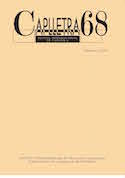Multilingualism at school: educational trends and new challenges
DOI:
https://doi.org/10.7203/caplletra.68.16474Keywords:
multilingualism, multilingual education, multilingual competence, translanguaging, multilingual didactics Abstract
Abstract
This article deals with the current educational trends in multilingual education and the challenges they pose. It presents the current linguistic portrait in most of the educational centres where several languages coexist both inside and outside the classroom. Different educational trends related to the promotion of multilingualism are explained, such as the importance of the maintenance of first languages, the early introduction of English, and new language teaching approaches, like CLIL and EMI. We also describe an emerging new paradigm, known as translanguaging, which adopts a real multilingual perspective and includes recent research on the acquisition of additional languages and multilingual competence. Finally, some notes about multilingual didactics and future lines of research are proposed.
 Downloads
Downloads
Downloads
Published
How to Cite
-
Abstract1398
-
PDF (Català)1007
Issue
Section
License
Authors submitting work to Caplletra for publication must be the legitimate holder of the usage rights. Legitimacy for the purposes of publishing the work must also include images, tables, diagrams and any other materials that may complement the text, whether they are the author of such material or not.
Copyright: on publishing their work in the journal, the author grants Caplletra. Revista Internacional de Filologia usage rights (reproduction, distribution and public communication) for both the paper printed version and for the electronic version.
All work published in Caplletra is covered by the Creative Commons license type Attribution-NonCommercial-NoDerivatives 4.0 (CC BY-NC-ND 4.0).
RESPONSABILITY
Caplletra. Revista Internacional de Filologia does not necessarily identify with the points of view expressed in the papers it publishes.
Caplletra. Revista Internacional de Filologia accepts no responsibility whatsoever for any eventual infringement of intellectual property rights on the part of authors.






